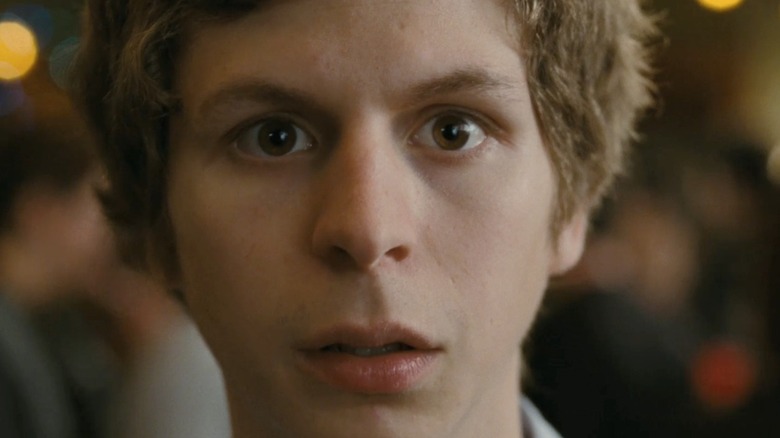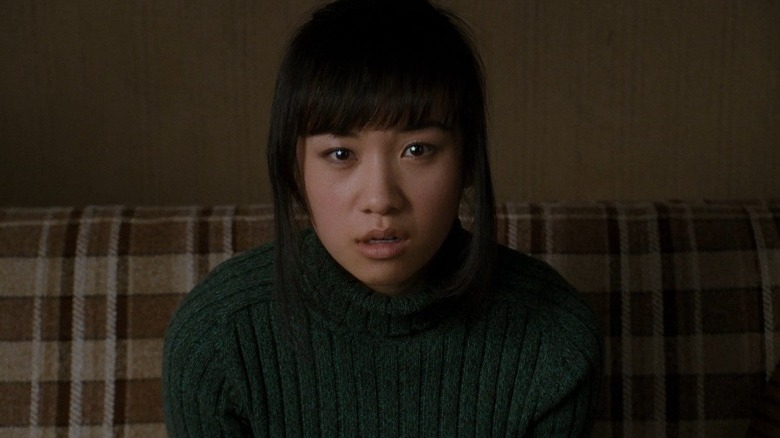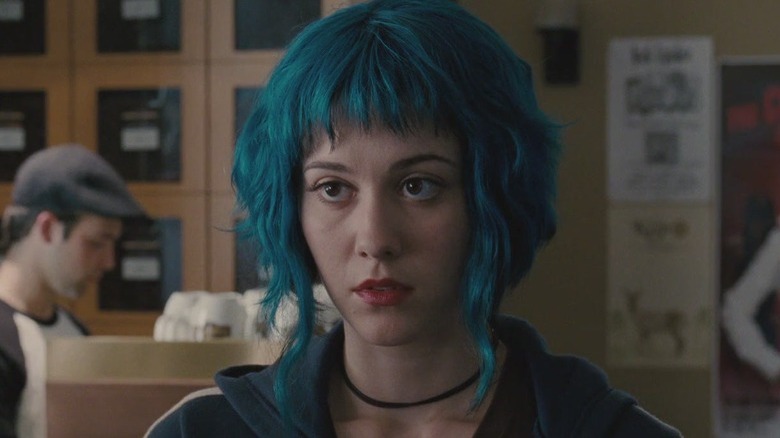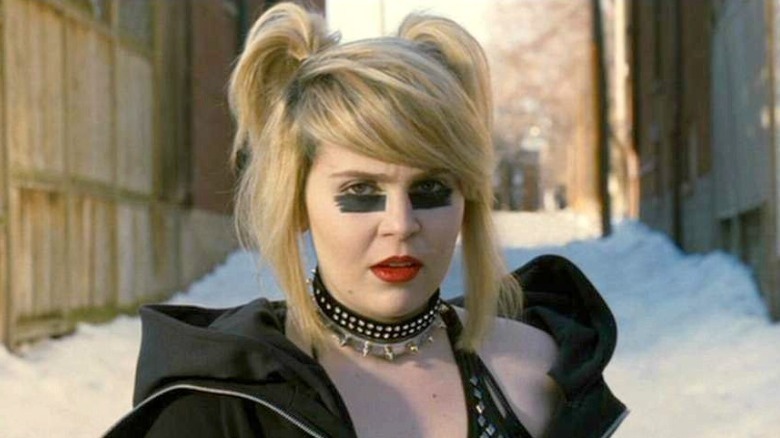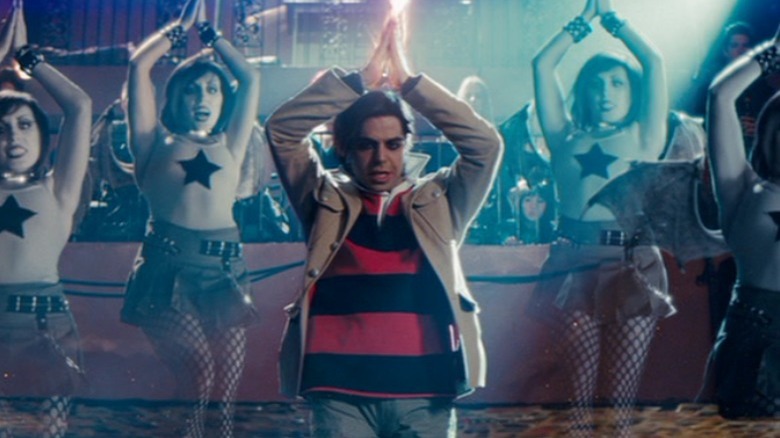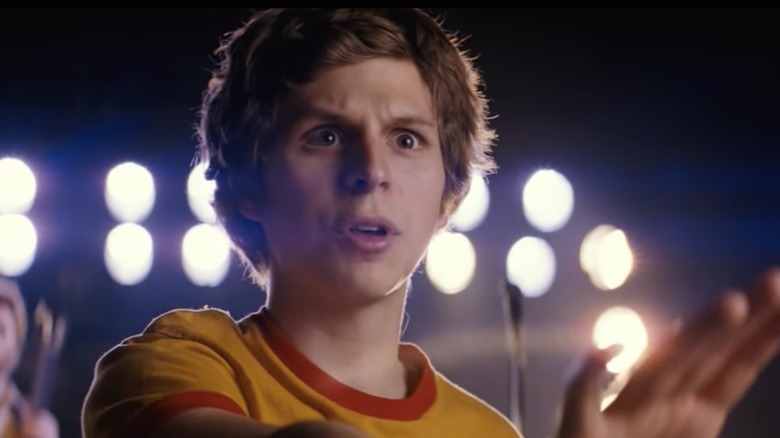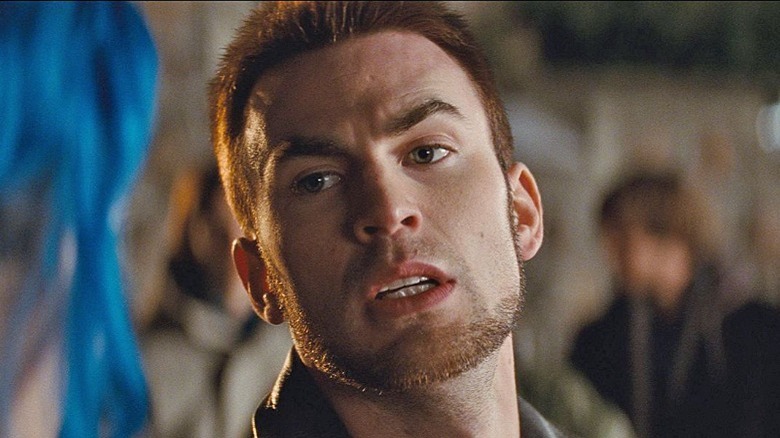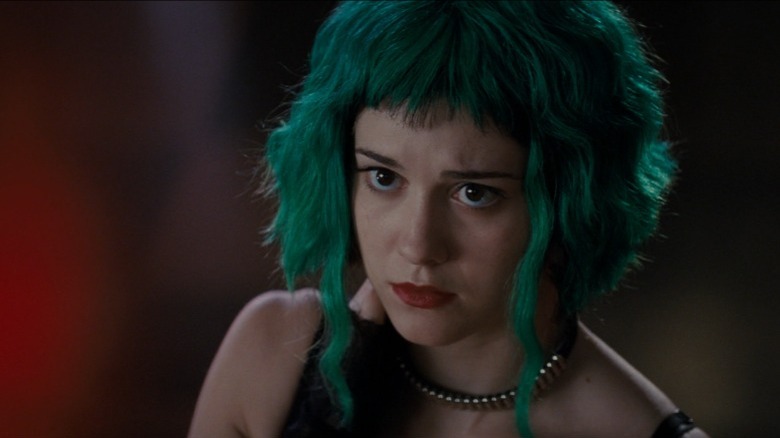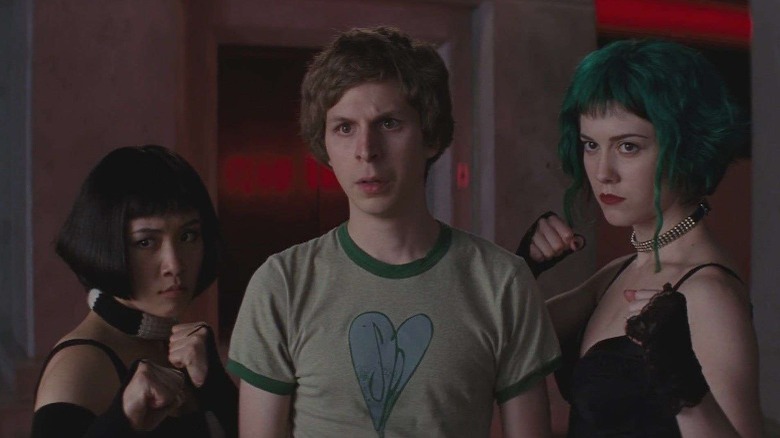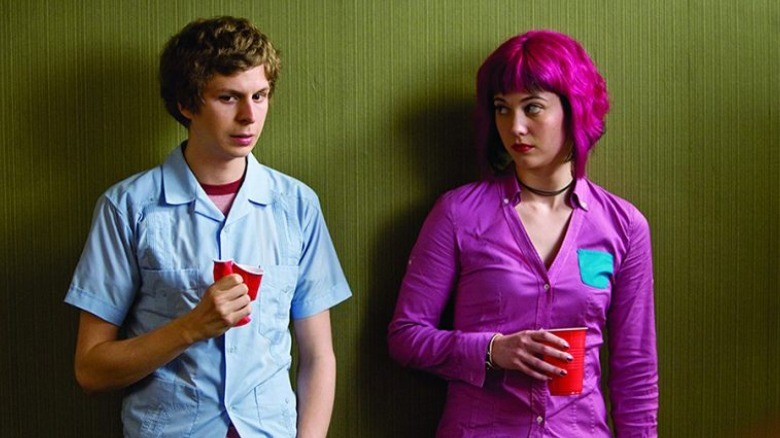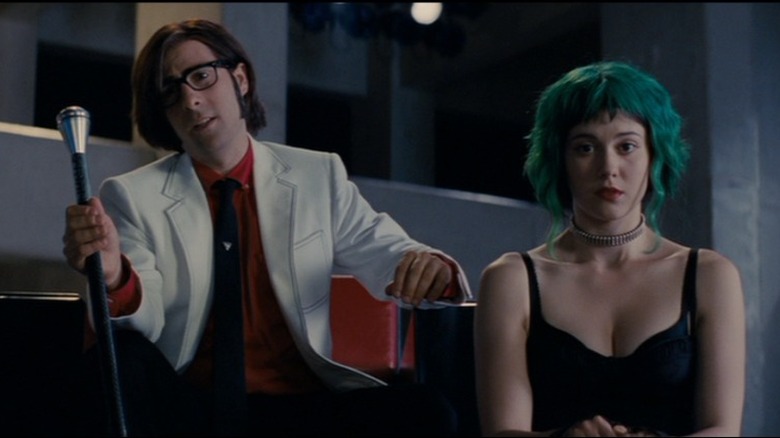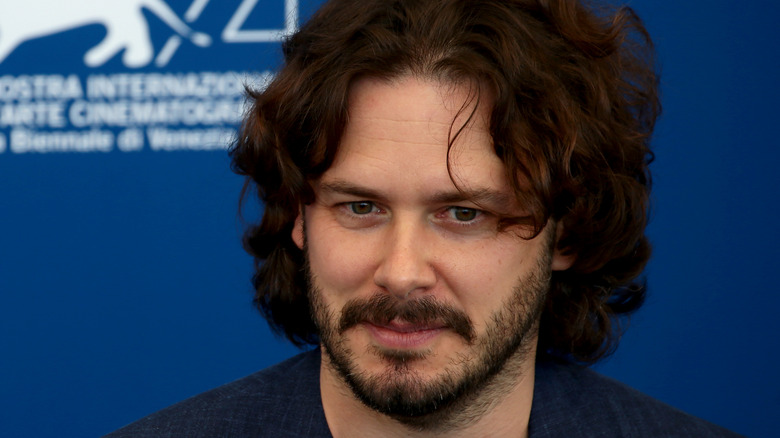Things Only Adults Notice In Scott Pilgrim Vs. The World
"Scott Pilgrim vs. The World" is a decade old, and this ode to the aimlessness of young adulthood, crappy bands, video games, and the far away land of Toronto still seems to have a loyal, growing cult following.
Starring a red-hot Michael Cera, who was joined by at least a dozen future stars (and some huge cameos you may have forgotten), the Edgar Wright film was nonetheless considered a dud upon its release — and was lumped in with "Youth in Revolt," "Paper Heart" and "Year One" to represent a series of missteps following Cera's meteoric rise on the merits of "Arrested Development," "Superbad" and "Juno.
But a decade later, similar-minded fare like "Free Guy" and the "Wreck-It Ralph" films have done big box office, perhaps indicating that "Scott Pilgrim" was merely ahead of its time. Or perhaps, the themes in "Pilgrim" were too old for the audience that was supposed to embrace it.
Now, that audience is a decade older, wiser and world-wearier. With that in mind, it seems like the perfect time to look back on "Scott Pilgrim vs. the World" and the unfolding revelations in the film you can only truly appreciate as an adult.
Scott Pilgrim is dating a high schooler? Gross.
The very first line of the movie informs us 22-year-old Scott Pilgrim is dating a high-schooler, the 17-year-old Knives Chau (Ellen Wong). Even though the audience subsequently learns that they haven't even kissed yet (and technically, from a legal standpoint, the age of consent in Canada is 16), it's still icky, and only gets worse as you get further and further from high school yourself.
Some of Scott's friends, to their credit, point out that Scott is hiding in a safe, pressure-free non-relationship in the wake of a breakup the previous year. Others, however, are completely fine with the idea, as Knives begins to attend Scott's band practice and shows. His roommate Wallace (Keiran Culkin) for some reason agrees to wait outside Knives' school with Scott until the final bell rings — just two grown adult men, lingering outside a high school, totally inconspicuous behavior. At the film's end, Ramona (Mary Elizabeth Winstead) even hints that Scott and Knives should get back together when she tells them they "make a good combo." What?
In fact, the ending originally shot for the film had Scott and Knives getting back together. When that divided test audiences, it was revised to Scott and Ramona starting over instead. But speaking with Collider in 2021, Wright explained that even in making that adjustment, "The key to it was that Knives lets him go." So even now, the one-sided relationship that many would say has all the hallmarks of an adult man "grooming" a teenager is considered a legitimate side of a love triangle? As the years go by, that part of the movie gets harder and harder to defend.
Ramona Flowers is a "Manic Pixie Dream Girl" without the mania
In a 2007 essay for the AV Club by Nathan Rabin about the movie "Elizabethtown," he coined a new phrase, saying: "The Manic Pixie Dream Girl exists solely in the fevered imaginations of sensitive writer-directors to teach broodingly soulful young men to embrace life and its infinite mysteries and adventures." Within a few years, it became a widely-used term to describe the many movies where a colorful, lively young woman (think Kate Winslet in "Eternal Sunshine of the Spotless Mind" or Natalie Portman in "Garden State") lures a mopey male protagonist out of his shell.
It's intriguing to consider Ramona Flowers in retrospect, considering whether she conforms to the trope. While she's a more detached, quiet character than your bubbly Zooey Deschanel types, she unfortunately fits all the other stereotypes. She never appears in the movie on her own, what glimpses we do get of her life are only in regards to her past relationships (i.e. the League of Evil Exes), and the movie never explains what drew her to Scott in the first place.
So, in place of personality and character, the audience gets a female lead who has lots of exes and colorful hair — along with a montage of people at a party telling Scott cryptic things like: "She's got some battle scars, dude!"
There is a relatively fun self-aware gag in the movie about Ramona appearing in Scott's dreams via a convenient subspace highway, which is how she becomes the "girl of my dreams." But although Mary Elizabeth Winstead brings admirable depth to the role with her performance, as the years go by it becomes harder to not wish there was more of a sense of who Ramona is when she's not simply servicing Scott's story.
The non-straight characters are hyper-sexualized
To be fair, the straight characters have a long list of exes as well — be they Ramona, Scott, or otherwise. But the way the only two LGBTQ characters are presented in "Pilgrim" might set off different reactions in focus groups today than it did a decade ago.
Wallace Wells, Scott's "cool gay roommate," has an active, seemingly polyamorous lifestyle. Which is fine — even Scott doesn't mind it, despite sharing the same bed — but it seems like Wallace can't have a single conversation without asking if boys go to Knives' school, or pretending that the girl Scott is referring to is a boy. From stealing Scott's sister's boyfriend during a concert to watching Lucas Lee (Chris Evans) film a movie because he's his "hetero-crush," it really is bizarre how every single opportunity for the person to speak turns into an opportunity to reinforce his sexual identity. Keiran Culkin's performance makes Wallace consistently amusing, but revisit the movie again and you'll be amazed at how one-note the character feels.
Roxy Richter (Mae Whitman), meanwhile, is all but ridiculed as "just a phase" by Ramona when she's revealed to be her fourth "Evil Ex." Given no other backstory or flashback than Ramona saying "I was just a little bi-curious," Roxy seems to exist just to make some lesbian-related puns (although to be fair, "bi-furious" is pretty solid), and then be defeated by a "weak point" behind her knee that causes her to ... orgasm? To death?
The non-white characters are tokenized
Another strange aspect of "Scott Pilgrim vs. The World" you might notice as you get older and more worldly is its off-kilter relationship with non-white characters. Matthew Patel (Satya Bhabha0, the first of Ramona's Evil Exes, is of Indian-Canadian heritage, a fact that isn't terribly relevant until he launches into a Bollywood dance number near the end of his fight with Scott. The fifth and sixth evil exes, the Katayanagi twins (Keita Saito and Shota Saito), fall into the "silent Asian" stereotype that was called out last year by "Mulan" actor Jimmy Wong, prevalent in shows like "The Boys" and "Umbrella Academy."
Even major character Knives Chau, while she gets plenty of lines and time to shine as a character beyond her ethnicity, is referred to in a strange, loaded moment when Scott says "she's Chinese" with a smirk while a mysterious sound effect from "The Legend of Zelda" plays. It's a small moment, but it plays into the larger trope of fetishizing Asian female characters, one that has come under fire in the years since the film's release.
Scott Pilgrim is a loser
Scott Pilgrim is unemployed. Scott Pilgrim is 22 and dating a high schooler in a strange, sexless pretend-relationship. Scott Pilgrim shares a studio apartment with another man, who owns all of the furniture and the lone bed. This studio apartment is across the street from "the house where [he] grew up," which implies some weird lower-case arrested development issues regardless of whether his parents still live there or not. Other than perhaps playing bass in an unheralded band, there isn't much about Scott Pilgrim that doesn't scream "loser."
Scott spends nearly the entirety of the film's runtime acting whiny, insecure, and selfish. He cheats on his high school girlfriend, then dumps her without explanation. He makes the barest attempts at apologies and introspection right before the film is over, and it's clear he hasn't grown much by the movie's conclusion. If they were to make a sequel, we'd most likely discover ten years later that Scott is still not nearly as cool as the original film frequently made him seem.
Chris Evans was wasted in the MCU
Chris Evans has appeared as Captain America in the Marvel Universe in 11 different movies. Granted, a few of those are cameos and post-credits scenes, but it's hard not to imagine what comedic roles he turned down to spend a decade in spandex after re-watching his uproarious turn as Lucas Lee in "Scott Pilgrim vs. The World."
Beginning with the moment he cracks his neck in time with the Universal Pictures fanfare, Evans generates the most consistent laughs per minute of any of the Evil Exes, or perhaps any character in the film. Playing an absurdly aggro movie star in a bit of self-parody, after his two movie turns as a pre-MCU Human Torch in the Fox "Fantastic Four" movies, Evans has perfect timing in declaring Scott Pilgrim no "competish" and throwing him into Toronto's iconic Casa Loma.
With Captain America now behind him, Evans' recent sly turn in "Knives Out" is hopefully just the tip of more interesting, diverse roles to come.
Ramona Flowers has no autonomy whatsoever
Beyond whether she qualifies as a "Manic Pixie Dream Girl" cliche or not, Ramona Flowers has a frustrating lack of agency in "Scott Pilgrim vs. The World," which feels all the more grating when you grow up and realize how complicated a good love story can be in movies disciplined enough to properly develop one. It's entirely unexplained why Ramona invites Scott back to her place and makes out with him, on a "date" that was explicitly pitched as a platonic hangout. While the revelation of the League of Evil Exes complicates her story and explains some of her detached attitude, it's not terribly clear how the League haunting her makes her feel, other than as it pertains to Scott.
When she abruptly leaves Scott to return to her ex Gideon (Jason Schwartzman), it's a bummer but at least a decisive action that hints at deeper motivations. But even that turns out to be telling someone else's story, as Gideon has attached a mind-control device to the back of her head, transforming her entirely into a damsel in distress for the film's big action climax. Adding insult to injury, she mostly takes a backseat in the showdown with Gideon, as Scott and Knives do most of the fighting.
Scott Pilgrim vs. The World fails the "Bechdel test"
"Scott Pilgrim vs. The World" was celebrated upon its release for having an array of diverse female roles. But in actuality, it fails the standard-bearer test of representation in cinema known as "The Bechdel test." Named for cartoonist Allison Bechdel, who depicted a rule that her friend had about movies for a 1985 comic strip, it goes like this: To pass the test, a film must have at least two female characters that talk to one another about something other than a man.
Revisiting "Scott Pilgrim vs. The World," it never quite passes. Even when Ramona, Knives, Envy, or whoever make small talk with another female character, it's always about Scott, Gideon, or some other mutual male friend or ex-boyfriend. The "Bechdel" test sounds so simple — give your character enough depth to say something other than a line that advances the male antagonist's story! — but in films like "Pilgrim," it is apparently impossible to imagine these female characters having their own distinct lives.
Scott doesn't learn a single thing
As adults, it's easy to be hard on an unemployed loser like Scott Pilgrim. It's a coming-of-age story, you might say, he's supposed to be a loser in the beginning. Surely he grows and changes over the course of the film? In a word, no.
Scott spends the majority of the film as a self-centered, entitled, whiny and defensive character. When he reluctantly admits to Knives and Ramona that he cheated on both of them, he at last has an opportunity to act mature, but Gideon stabs him in the back, killing him. In a video-game twist, an extra life that Scott earned earlier allows him to come back and replay the final fight again. This time, he gets a brief monologue where he reveals to Knives and Ramona that he cheated on them voluntarily, but still doesn't have to deal with any significant consequences.
In this final sequence, the first time through, he fights Gideon with a sword he earned through "the power of love," but on the second pass he earns it through "the power of self-respect." This makes no sense, because Scott has demonstrated that if anything, he has too much self-respect over the events of the movie. Is there a sword you earn by respecting the women in your life? Because Scott needs to earn that one way more.
It's essentially an ode to toxic masculinity
It's a tale as old as time: Boy meets girl, boy and girl fall in love, boy has to fight every man (and woman?) that girl has ever been with to prove ... something?
"Scott Pilgrim vs. The World" is largely a video game-inspired fantasy, so maybe it's not fair to hold it to a coherent standard in terms of today's gender politics. But the older you get (and perhaps, the more therapy you go to), the more you start to realize that the League of Evil Exes is more than just a framework to structure the story around — it's toxic masculinity in its purest form.
Without much nuance or backstory, the fighting in the movie reduces dating to a tournament where Ramona is the prize, objectifying women as objects to be fought over instead of human beings with willpower, thoughts and feelings. While this is partially the result of distilling a six-volume graphic novel into a two hour film, it ultimately creates something that's fun and flashy, but reduces gender roles to a digital binary: men are stoic warriors, while women are princesses in towers to be claimed as rewards.
It's a shame Edgar Wright hasn't directed a superhero movie
The fight scenes in "Scott Pilgrim vs. The World" are easy to follow while still being spectacular, and they make the loss of Edgar Wright's "Ant-Man" directorial gig feel like that much more of a lost opportunity. The story of his falling out with Marvel is well known, but as the years pass it's hard not to wonder what he could have done with an even bigger budget in the MCU instead of, say, "Baby Driver" and a potential sequel to "Baby Driver."
His penchant for rapid-fire edits, montages of preparatory close-ups, and gift for matching the rhythm of scenes to soundtrack music made "Scott Pilgrim vs. The World" one of the best comic adaptations at the time of its release, and it would have been fun to see that style brought to the MCU. As much as creators like the Russo brothers, Joss Whedon, and Taika Waititi have left their marks on certain MCU films (including Peyton Reed, who became the eventual "Ant Man" director in place of Wright), it's hard to think of a Marvel film with a comparable visual flair to Wright's adaptation of the "Scott Pilgrim" series.
Why isn't Ellen Wong a superstar!?
With the exception of Michael Cera, virtually every member of the cast of "Scott Pilgrim vs. The World" was more or less on-the-rise, and has seen their careers since further blossom. Looking back now, you see Aubrey Plaza before "Parks and Recreation," Chris Evans and Brie Larson before the MCU got them, Anna Kendrick before "Up in the Air" and "Pitch Perfect," and the list goes on.
But when the film hit theaters in 2010, the consensus seemed to be that Ellen Wong had stolen the show as Knives Chau, and seemed poised to be the film's breakout.
In the years since, Wong has worked steadily, and played a semi-prominent supporting role on Netflix's "GLOW" for three years before its cancellation — yet, the Ellen-Wong-mania that seemed poised to materialize a decade ago never quite went down as planned. Looking back now as an adult, perhaps it's time to once again appreciate her performance — and seek out some of the smaller roles she's capably filled in the years since.
